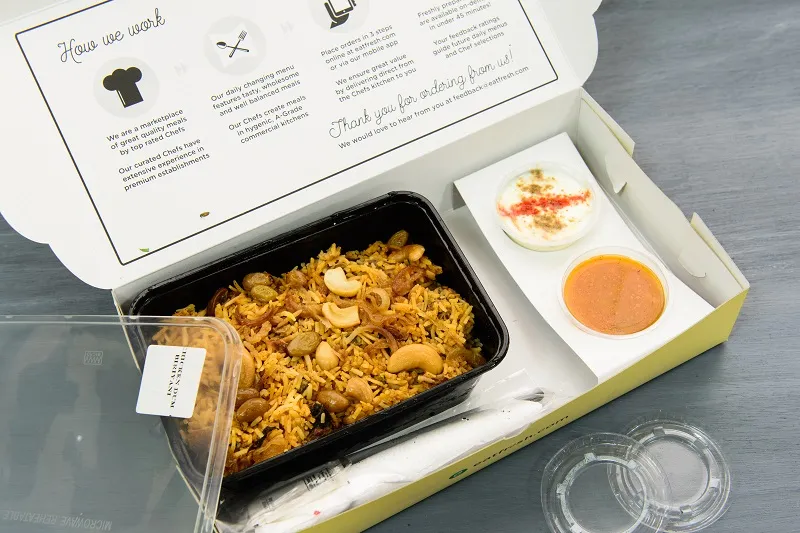From Ovenfresh to Eatfresh – why this baker from Chennai ventured into the internet restaurant space
While we might be jaded and bored of the different number of foodtech startups and players, one simply cannot deny the convenience they bring. From a quick bite during brunch to an interesting spread for lunch meetings, many food startups are providing the much needed choice.
Be it FreshMenu, Swiggy, Zomato, Holachef or InnerChef, each of these players are working to crack the food delivery, internet restaurant, and the discovery model. What becomes more interesting is when a foodtech platform is started out by an entrepreneur who has already created a profitable venture in the food and desert space – Ovenfresh.
Last year when the foodtech space was facing questions on unit economics, the Ovenfresh team had already built a profitable chain of 50 outlets in Chennai and Bengaluru serving over 8,000 customers in a day.

Bringing in knowledge to the space
“We observed the emergence of online ordering among Indian consumers, and realised that we held a unique advantage to capture consumer needs given our operating experience and learnings at Ovenfresh,” says Rajiv Subramanian, Founder and CEO of Eatfresh.
Following a full-stack approach, Eatfresh has a daily changing menu of chef-made meals, salads, desserts, and beverages. The chefs operate from Eatfresh owned commercial kitchens and the team controls the supply chain from procurement to last-mile delivery.
Rajiv had noticed that several of the players at that point in time were adopting superficial approaches of layering an app over outsourced food, and were running glorified aggregator models. He says that from their experience of building a profitable business, the team had realised that the economics of this space would work only for a full-stack model where gross margins would be higher than 50 percent.
“The decision to launch Eatfresh was a straightforward one, given our strengths and scale of the opportunity. This has held us in good stead to emerge as the fastest growing breakout player in the full-stack space,” says Rajiv.
Building a full-stack model
To build Eatfresh, Rajiv roped in Vinay Karodia, who previously worked on building Ola’s delivery business; Sharan UR, who used to run a restaurant facing startup; and Jipy Mohanty, who had first-hand seen the sort of demand that exists for food delivery at a horizontal on-demand startup earlier.

The Eatfresh team believes that ordering food should be as easy as flipping a light switch. The product catalogue on the platform changes daily and the inventory is replenished by the hour.
The team claims to have tightly integrated their consumer facing and internal systems to have the quantity available on the website, which can actually be delivered within 45 minutes.
The customers can track the order right from the time the order gets routed to the nearest delivery hub, to chefs working on it and assigning it for delivery. Eatfresh also has IoT-enabled temperature sensing devices and geo-location detecting apps, which ensure that the food not only arrives on time but also comes with the right temperature and has the taste that the chefs intend to deliver.
Breaking through the clutter
When it comes food commerce business, Rajiv believes that, customers come to the platform with only one ‘intention’ – to eat and eat now. Ensuring that design and technology is highly integrated helps the team delight customers by creating a fast, friction-free experience.
By end of the first quarter of the year, the space had already attracted funding of $51,500,000 across 10 deals. The big deals of the space include FreshMenu’s Series A funding and Swiggy’s Series C funding of $35 million.
While there are several players crowding the space, especially in a city like Bengaluru, investors like Sateesh Andra, Endiya Partners, and Phanindra Sama, Co-founder of redBus, believe that a food startup has control over the entire stack and supply chain to see sustainable growth. Both Sateesh and Phanidra have invested in another internet restaurant – InnerChef.
Eatfresh claims to have an annual revenue run rate of over Rs 25 crore. The team claims that they see over 10X growth in sales and orders over the period of last six months, with a CAGR of approximately 30 percent month-on-month. “We have added 11 new Eatfresh delivery hubs in Bengaluru in just a few months,” adds Rajiv. The team refused to share details on the average order size and total number of orders in a day.
Backed by Kalaari Capital from their Ovenfresh days, Rajiv believes that the team has solved for unit economics, ROI, and scalability in this space and are looking to enter a high growth phase.
Speaking of the future plans, he says: “We are speaking to selective investors who have approached us with interest in this next stage of growth. Food is a large and clear multi-billion dollar opportunity in India, and our full-stack model with over 50 percent in gross margins has emerged as the only certain way to scale profitably.”
Eatfresh currently looks at further penetration of deliveries in Bengaluru and launch of the Eatfresh model in Chennai, where they already have significant operations for Ovenfresh. Besides having larger visibility in Bengaluru and Chennai, the team also intends to take Eatfresh to Hyderabad, Mumbai, and Delhi NCR in the next 12-24 months.







